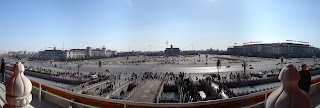The summer of 2009 marks the twentieth anniversary of the 1989 Tiananmen Square Protests, which were a series of political manifestations in Tiananmen Square that turned from peaceful to violent in just a number of short weeks.
1. What is Tiananmen Square?
Tiananmen (simplified: 天安门广场; pinyin: Tiān'ānmén Guǎngchǎng) is a large plaza near the center of Beijing literally meaning the Gate of Heavenly Peace and has been the sight of numerous political events and student protests. It was built in the 1420s by the Ming Dynasty and was originally designed to be the front door to the Forbidden City.
2. Why did people start gathering in April of 1989 in Tiananmen Square?
Students, workers, and officials began gathering in Tiananmen Square after Hu Yaobang, a former communist party chief and leading reformist, died of a heart attack at the age of 73 on April 15. Mourners paid their respects to Yaobang, but also expressed their disapproval of the Chinese government’s pace of reform in the country. The demonstrations spread as thousands more joined the cause and lasted until June 4th when government officials decided to use forceful measures to suppress the protests.
3. What led to the June 3rd-4th shootings?
After about a month of strong protests by gatherers, the Chinese government declared a state of martial law in several districts in Beijing and began to move troops in. Although the presence of government troops did not slow down the protests at first, hundreds and perhaps even thousands died after Communist Party elders approved the decision to put down the “counter-revolutionary riot” by force.
4. International Reaction
Most of the Western world including the United States and Britain denounced the Chinese government’s use of forceful action to suppress the protests whereas many African and Asian nations stayed silent during the protests. Countries such as North Korea, Cuba, East Germany, and Pakistan supported the Chinese government’s response.
The EU condemned Chinese government response and cancelled all high level contacts and loans with China. The EU maintains an arms embargo against China to this day.
George H.W. Bush suspended military sales and visits to China.
5. Why Care?
Whether or not you agree with the Chinese government’s response to the 1989 protests is your own personal choice. What may be even more important to consider below the surface of this monumental event though, are the intricacies and the history of the Chinese nation. All current day politics are bound to reasons of historical importance and value. Why did the government decide to respond the way they did instead of using another tactic? What are some clues from China’s history that can direct us to understand the governmental thinking that ultimately lead to an extremely bloody silencing? Look beyond the surface. Search deeper and always ask why they may have acted the way that they did.
Furthermore, as we approach the twentieth anniversary of the killings, the Chinese government has been surprisingly silent. Do you think this could be a part of China’s history that governmental leaders are embarrassed about and would like to forget? Or could it be that the Chinese government chooses not to respond to the anniversary of the killings because they believe, to this day, that they were in the right and therefore, do not e need to justify their prior actions?
To find out more about the Tiananmen Square Protests, check these sights out!
Tiananmen Square Interactive Map: http://news.bbc.co.uk/2/hi/asia-pacific/8070177.stm
The BBC: http://news.bbc.co.uk/onthisday/hi/dates/stories/june/4/newsid_2496000/2496277.stm
Until next time,
Jen
Monday, June 1, 2009
Subscribe to:
Comments (Atom)
